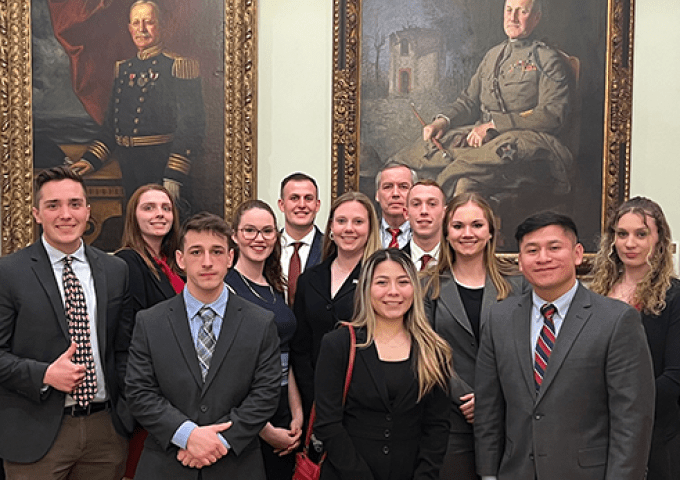

The Department of History and Political Science
The Department of History and Political Science provides you with the tools necessary to function as responsible and productive community members.
Stretch your knowledge across different opinions and beliefs to understand how to work effectively with others and respect all perspectives at a deeper level. You'll delve into the importance of thinking independently and critically. We encourage the growth of self-discipline, intellectual ability, critical thinking, and how to express your ideas with clarity and precision. With a hands-on learning approach, you'll explore opportunities to learn outside the classroom at every step of your academic journey.
Special academic opportunities include working with faculty one-on-one on research projects during the summer, in independent studies during the academic year, and in a two-semester senior Honors program. The faculty in the department also encourages off-campus study, whether in the Washington, D.C. area or another country!
The Norwich Difference
Average of 2300 undergraduates on campus
Students can earn up to $30K in merit aid
Outstanding 16:1 student to faculty ratio

Students assemble on the Upper Parade Ground to recreate phalanxes of the ancient Greek soldiers during a reenactment of a hoplite battle.
History Program
Delve into the influence of political, economic, social, and cultural forces on past and contemporary events, institutions, and peoples.
You'll develop the skills to analyze, compare, and evaluate different explanations of past and present subjects. You'll use reason and evidence to guide your research of significant events.

Political Science Program
Cultivate your powers of analysis and exposition in reading, writing, and communication. You'll explore the realm of politics; its vocabulary, principal concepts and strategies, ethics, and expediencies. Plus, you'll have exciting internship opportunities including Norwich's institutional affiliation with the Washington Semester Program (WSP), which is the oldest, most prestigious, and well-known experiential education program in the world.

Studies in War and Peace (SWAP) program
Examine the origins and development of military institutions and their impact on social order. The SWAP program continues the Norwich tradition of producing "citizen soldiers" — educated graduates who are prepared for military or civilian pursuits. You'll be knowledgeable on diplomatic and military affairs.
Enhance Your Career Path
Honors in History and Political Science
Want to graduate with honors in history or political science? Here's how to be considered:
Earn a grade point average of 3.0 or higher.
Meet all university and departmental curricular requirements.
Have grades averaging 3.2 or higher in courses in your major.
If you do not meet these standards, you may be invited to candidacy by the department. Six credits will be assigned, normally three hours each semester. A successful defense of an honors paper must be conducted and a minimum grade of 3.5 must be earned for the student’s registration in an Honors Course to appear on the transcript. For further guidance, see the History and Political Science Department’s Honors Thesis Guidelines.
Pre-Law Training Faculty Advisor: Jason Jagemann
The Association of American Law Schools identifies the following as the major objectives to be sought in an undergraduate pre-law curriculum:
Comprehension and expression in words;
Critical understanding of the human institutions and values with which the law deals;
Creative power in thinking.
These goals can best be approached with a curriculum where social sciences and English play the leading part. One of the leading American law schools advises college students preparing to study law: “The importance of history in a pre-legal program cannot be over-emphasized”; and of political science: “This subject also is one with which the lawyer must be well-acquainted and it, too, is a natural college major for pre-law students.” Accounting (for which mathematics is a prerequisite) is also strongly recommended by law schools.
Meet Our Faculty
Contact:
Yangmo Ku
- Associate Director, Peace and War Center
- Chair, Department of History and Political Science
- Associate Professor
- yku@norwich.edu
- Ainsworth 216










